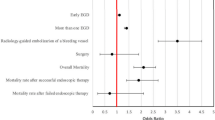Abstract
Distinct groups of patients at high risk for the development of peptic ulceration of the stomach and duodenum have been identified. As newer forms of treatment for critical illness evolve, it seems probable that other high-risk groups will be described. The etiology of the ulcerations appear to be different for each group. The presence of intraluminal acid is correlated with the incidence of bleeding. Acid-reducing therapy, whether intraluminal or intravenous, is effective in decreasing the risk of bleeding to variable degrees among the high-risk groups but does not prevent or reduce the incidence of ulceration. When surgical therapy is needed, no operation is superior.
Résumé
Divers groupes de malades à haut risque (stress, transplantation rénale, médicaments, brûlures, infections, traumatismes céphaliques, etc.) sont prédisposés au développement d'un ulcère peptique gastrique ou duodénal. Avec l'apparition de nouvelles thérapeutiques chez les malades présentant une affection grave, il est probable que de nouveaux groupes pourront Être individualisés. L'étiologie de l'ulcère est variable en fonction de chaque groupe. L'existence d'une acidité intra-gastrique est en corrélation avec la fréquence de l'hémorragie. Le traitement anti-acide par os ou par voie intra-veineuse est efficace. Il diminue le risque de l'hémorragie d'un degré variable chez les malades à haut risque mais il ne réduit pas la fréquence de la maladie ulcéreuse. Lorsque le traitement chirugical se montre indispensable, aucune technique n'est supérieure à une autre.
Resumen
Diferentes grupos de pacientes con alto riesgo de desarrollar ulceración péptica del estómago y duodeno han sido identificados. Es posible que otros grupos de alto riesgo sean descritos en la medida que evolucionan las nuevas modalidades de manejo del paciente en estado crítico. La etiología de la ulceración aparece diferente para cada grupo. La presencia del ácido intraluminal se correlaciona con la incidencia de la hemorragia. La terapia reductora de ácido, bien sea de tipo intraluminal o intravenoso, es efectiva en cuanto a la disminución del riesgo de sangrado, en grado variable, en los diferentes grupos de alto riesgo, pero no previene o reduce la incidencia de ulceración. Una vez, que se presenta la necesidad de intervención quirÚrgica, ninguno de los diversos tipos de operación demuestra clara superioridad sobre los otros.
Similar content being viewed by others
References
Skillman, J.J., Bushnell, L.S., Goldman, H., Silen, W.: Respiratory failure, hypotension, sepsis and jaundice. Am. J. Surg.117:523, 1969
Greenburg, A.G., Saik, R.P., Bell, R.H., Collins, G.M.: Changing patterns of gastrointestinal bleeding. Arch. Surg.120:341, 1985
Friedman, C.J., Oblinger, M.J., Suratt, P.M., Bowers, J., Goldberg, S.K., Sperling, M.H., Blitzer, A.H.: Prophylaxsis of upper gastrointestinal hemorrhage in patients requiring mechanical ventilation. Crit. Care Med.10:316, 1982
Schuster, D., Rowley, H., Feinstein, S., McGue, M., Zuckerman, G.R.: Prospective evaluation of the risk of upper gastrointestinal bleeding after admission to a medical intensive care unit. Am. J. Med.76:623, 1984
Peura, D.A., Johnson, L.F.: Cimetidine for prevention and treatment of gastroduodenal mucosal lesions in patients in an intensive care unit. Ann. Intern. Med.103:173, 1985
Basso, N., Bagarani, M., Materia, A., Fiorani, S., Lunardi, P., Speranza, V.: Cimetidine and antacid prophylaxis of acute upper gastrointestinal bleeding in high risk patients. Am. J. Surg.141:339, 1981
Priebe, J.H., Skillman, J.J., Bushnell, L.S., Long, P.C., Silen, W.: Antacid versus cimetidine in preventing acute gastrointestinal bleeding. N. Engl. J. Med.302:426, 1980
Zinner, M.J., Zuidema, G.D., Smith, P.L., Mignosa, M.: The prevention of upper gastrointestinal track bleeding in patients in an intensive care unit. Surg. Gynecol. Obstet.153:214, 1981
Stremple, J.F.: Stress ulceration—revisited. Surg. Rounds, December:40, 1979
Rachmilewitz, D.: Cimetidine vs. antacid in critically ill patients. Gastroenterology80:869, 1981
Moore, T.C., Hume, D.M.: The period and nature of hazard in clinical renal transplantation. I. The hazard to patient survival. Ann. Surg.170:1, 1969
Owens, M.L., Passaro, E., Jr., Wilson, S.E., Gordon, H.E.: Treatment of peptic ulcer disease in the renal transplant patient. Ann. Surg.186:17, 1977
Ahonen, J., Eklund, B., Lindfors, O., Kuhlback, B., Lindstrom, B.L.: Peptic ulceration in kidney transplantation. Proc. Eur. Dial. Transplant Assoc.14:396, 1977
Doherty, C.C., O'Connor, F.A., Buchanan, K.D., Sloan, J.M., Douglas, J.F., McGeown, M.G.: Treatment of peptic ulcer in renal failure. Proc. Eur. Dial. Transplant Assoc.14:386, 1977
Archibald, S.D., Jinseh, D.W., Bear, R.A.: Gastrointestinal complications of renal transplantation. Can. Med. Assoc. J.119:1291, 1978
Wood, R.P., Shaw, B.W., Jr., Starzl, T.E.: Extrahepatic complications of liver transplantation. Semin. Liver Dis.5:377, 1985
Castles, J.J., Moore, T.L., Bolzan, J.A., Lee, M., Lidsky, M.D., Caldwell, J.R., Ehrlich, G.E., Sharp, J.T., Kaye, R.: Multicenter comparison of naproxen and indomethacin in rheumatoid arthritis. Arch. Intern. Med.138:362, 1978
Alexander, S.J.: Clinical experience with naproxen in rheumatoid arthritis. Arch. Intern. Med.135:1429, 1975
Silvoso, G.R., Ivey, K.J., Butt, J.H., Lockard, O.O., Holt, S.D., Sisk, C., Baskin, W.N., Mackercher, P.A., Hewett, J.: Incidence of gastric lesions in patients with rheumatic disease on chronic aspirin therapy. Ann. Intern. Med.91:517, 1979
Metzger, W.H., McAdam, L., Bluestone, R., Guth, P.H.: Acute gastric mucosal injury during continuous or interrupted aspirin ingestion in humans. Am. J. Dig. Dis.21:963, 1976
Czaja, A.J., McAlhany, J.C., Pruitt, B.A.: Acute gastroduodenal disease after mucosal injury. N. Engl. J. Med.291:925, 1974
Pruitt, B.A., Goodwin, C.W., Jr.: Stress ulcer disease in the burned patient. World J. Surg.5:209, 1981
LeGall, J.R., Mignon, F.C., Rapin, M., Redjemi, M., Harari, A., Bader, J.P., Soussy, C.J.: Acute gastroduodenal lesions related to severe sepsis. Surg. Gynecol. Obstet.142:377, 1976
Martin, L.F., Max, M.H., Polk, H.C., Jr.: Failure of gastric pH control by antacids or cimetidine in the critically ill: A valid sign of sepsis. Surgery88:59, 1980
Halloran, L.G., Zfass, A.M., Gayle, W.E., Wheeler, C.B., Miller, J.D.: Prevention of acute gastrointestinal complications after severe head injury: A controlled trial of cimeditine prophylaxis. Am. J. Surg.139:44, 1980
Author information
Authors and Affiliations
Rights and permissions
About this article
Cite this article
Stabile, B.E., Tzu-Ming, C., Hiatt, J.R. et al. Peptic ulcer complications in high-risk patients. World J. Surg. 11, 345–349 (1987). https://doi.org/10.1007/BF01658113
Issue Date:
DOI: https://doi.org/10.1007/BF01658113




